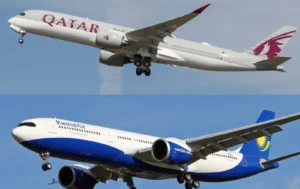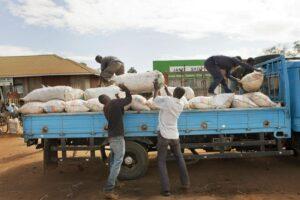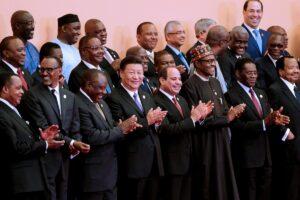- Africa’s new dawn: the rising role of digital and AI in agriculture
- Can Dangote Refinery Transform Africa Energy Ambition
- Gallup Survey: 80 per cent of Kenyan Workers Are Disengaged and Seek New Opportunities
- Madagascar Man Freed from 5KG Tumor After 15-Year Struggle
- How women in Africa are perceived and treated
- Sugar consumption in Kenya to Increase to 1.23 Million Tonnes
- Can Somalia and Turkey Oil deal Bring Change in Somaliland
- Remittances to Kenya dropped to $371.6 million in June, marking a six month low
Manufacturing
Africa has been hailed as the next frontier in the provision of global oil and natural gas resources, especially now in the wake of the ongoing Russia-Ukraine war.
This crisis has not only altered the global energy landscape, but also instigated an inflation in gas prices, given the former’s position in the hierarchy of major global producers. As sanctions continue to soar, Europe has embarked on a quest to find contingency energy supplies, as it seeks to minimize its dependency on Russia; which has already cut off gas supplies to countries like Finland, Poland and Bulgaria, over energy payment disputes.
Consequently, Africa’s gas resources have gained a newly found prominence, pertinently by the European Union (EU); owing to the continent’s rich endowment of oil and deep gas reserves. The mounting global demand for gas, has been pushing international energy companies to reconsider African projects. The numerous ongoing and upcoming oil …
However, all efforts have been directed in that sector to try and make it greener and cleaner. Among consumers, a major shift is now being witnessed with most of the industries investing in clean energy sources that are both affordable and sustainable.
Such initiatives have made Kenya be rated among the top countries that are implementing their nationally determined contributions that seek to cut greenhouse gas emissions in the country by 32 per cent by 2030.
The latest industry to have made noted efforts to transit to clean Energy is Bamburi Cement Factory situated in Bamburi Mombasa.…
- Varun Beverages has become one of the country’s biggest beverage firms in Zimbabwe
- Delta has had a firm grip on the Zimbabwean drinks market and is home to international brands of soft drinks and beers
- Varun is on an aggressive urban assault to capture more market share and challenge the drinks giant.
Varun Beverages has become one of the country’s bigger soft drinks firms in Zimbabwe within a relatively short period.
Bottlers of Pepsi, 7up and Mirinda brands, Varun has established itself as one of the soft drinks companies to reckon with in the soft drinks market.
This is an impressive achievement given it is going toe-to-toe with long-established Delta, Zimbabwe’s most prominent beverage firm with big brands such as Coca-Cola, Fanta and Sprite.
Since the colonial era, Delta has had a firm grip on the Zimbabwean drinks market and is home to international brands of soft …
Tapping into its global strategy, the Coca-Cola System in Kenya has unveiled its innovative portfolio of beverages into the market to offer customers more choice and convenience.
The organization, which is evolving to become a Total Beverage Company, has been reshaping its growth strategy and operating model in line with changing consumer tastes and buying habits.
Since 2017, it has broadened its product offerings in various category clusters including water, nectar juice, ready to drink coffee, tea bags and sports drinks.
Amongst the new products launched this week was an addition to the Minute Maid portfolio; Minute Maid Nutridefenses – a nectar juice fortified with vitamin E and Zinc, a suitable addition to the breakfast occasion.
Coke plus Coffee; a fusion of Coca-Cola and coffee with a formulation of added coffee and fifty percent less sugar. This drink targets the afternoon slump to help rejuvenate consumers and give them the …
Over 50 per cent of Kenyan manufacturers feel the sector is struggling to compete with developed countries with equal pressure coming from regional states, a study has revealed.
This is in the wake of continued high costs of doing business in the country with the local market further being infiltrated by cheap imports mainly from China.
READ:What is hurting manufacturing in Kenya
The study has been unveiled by SYSPRO, a global provider of industry-built Enterprise Resource Planning (ERP) software for manufacturers and distributors, together with Strathmore University.
External factors
In the findings, energy leads as the top factor affecting businesses with a 54 per cent prevalence followed solely by the country’s political climate which accounts for 50 per cent of effect to investments.
The third most toxic factor affecting businesses is taxes with 43 per cent prevalence. Others are cheap imports (40%), exchange rates and raw materials each at …
With this collapse, more than 1,000 employees lost their jobs and farmers who provided about 900 tonnes of cotton to Rivatex lost the market.…
Over seven hundred and eighty micro, small and medium enterprises (MSMEs) in Kenya’s Lake Region are set to benefit from the new, ultra-modern Kenya Bureau of Standards (KEBS) regional headquarters in Kisumu.
The new facility not only houses the KEBS regional offices but is also equipped with four laboratories including Food and Agriculture, Microbiology, Biochemistry and Instrumentation. The laboratories will offer testing, metrology and calibration services to the Lake Region industries including fishing and fisheries, water purification and bottling, tea factories, grains and cereals, sugar, animal feeds, fertilizers and the hospitality sector.
Speaking during the official opening of the facility, KEBS Ag. Managing Director Lt. Col (Rtd). Bernard Njiraini reiterated the institution’s commitment to promoting standardization in industry and trade at the county level through investing in requisite resources and infrastructure for standards development, conformity assessment, testing and metrology.
“The Kisumu office will ensure that the region receives adequate support …
The Kenya Bureau of Standards (KEBS) is spearheading a countrywide inter-agency initiative targeting stakeholders of Kenya’s informal craftsmen popularly known as Jua Kali to unlock barriers hindering their growth. KEBS, whose key mandate is to ensure standards are adhered to while ensuring fair and just trade, is working with the Kenya Revenue Authority, Anti-Counterfeit Authority, Export Promotion Council, KenInvest and Youth Enterprise Fund.
In the past stakeholders mainly from the Kenya National Federation of Jua Kali Association have cited tough regulations that introduce layers of red tape across government agencies as huge barriers to their survival.
“We are cognizant of the key role the MSME sector plays in Kenya’s economy. These forums are important to not
only understand their challenges but also explore ways of working across agencies to create an enabling environment anchored on simplified procedures and regulations,” said Dr. Henry Rotich, Director of the Metrology and Testing Division …
Kenya’s shifting trends in 2018 on alcohol consumption are influenced by a move to cider preference.…
























